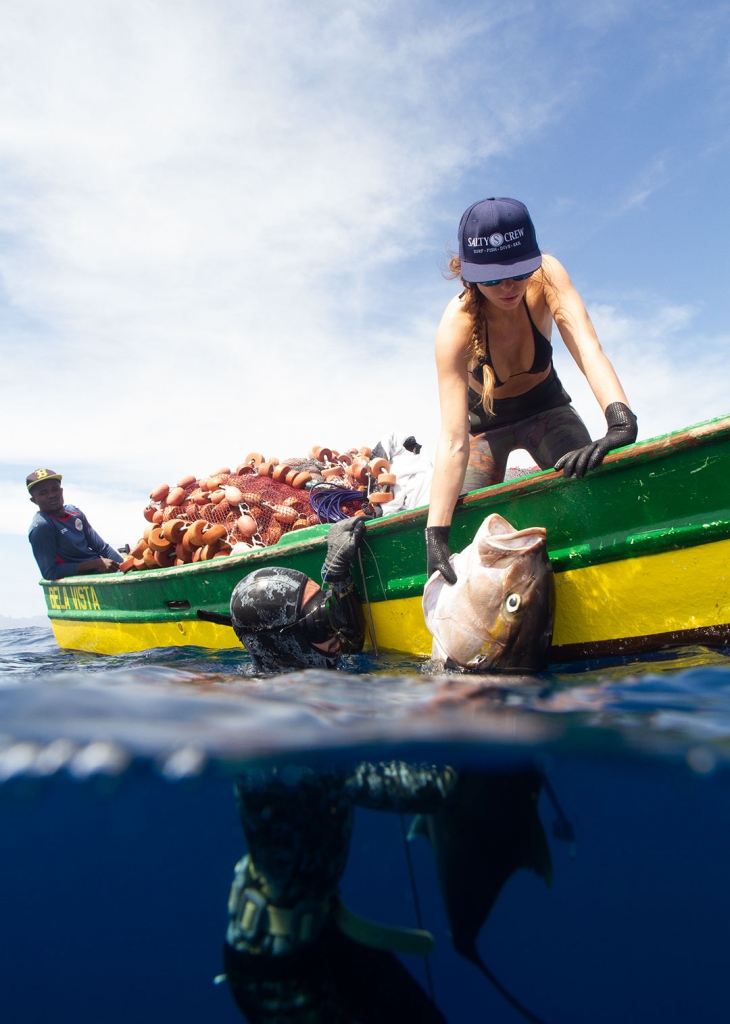New Narratives
Raw barter
Valentine Thomas tells us about how she left her corporate life to live like a local spearfisher in Cape Verde.
TEXT Valentine Thomas
COVER PHOTO Justin David
Day 21—São Vicente.
Fatigue and hunger started to play on our collective mental health. With four weeks to make a documentary and only 150 euros left between four people after all the travel and gear costs, fish—yes, fish—soon became our only form of currency.
We wanted to share with the world the true and pure lifestyle of spearfishing, and we were living it at its extreme. The four of us set out to visit a small fishing village, São Vicente, in Cape Verde, where our nearest grocer would be miles away. So, before we left, we filled our suitcase with rice, pasta, and canned tuna. What we did not know, however, was that the island had no burning wood and gas was a rare commodity; one we were unable to find. Unable to light a fire, we had to eat what fish we caught raw for an entire week. It definitely took a toll on us. We rationed our food. Lunch was a can of tuna shared four ways and dinner, the catch of the day, raw.

I kept telling myself that this was a choice. I’d left my “normal,” corporate life in London behind a year before in order to discover who I truly was, and I was served. Nothing will teach you more about yourself than finding yourself with no possessions and no way out. Your true personality comes out when you’re starving.
And yet, in Cape Verde, if you give a man a few fish, no matter how hungry he may be, he’ll share everything he has with his friends and family. Pretty quickly, my own personal journey was met with an intense reappraisal of my sense of community, and a desire to glean some of these values when a local man lent us a small space to live for free. The people in this village are richer than the sum of their exports.
We gambled our last cents on a boat. The locals would charge us only for gas to take us out and we shared our profits from the fish caught and sold at the market with them. A couple days before a full moon is prime time for deep-sea spearfishing, so this was our chance to get big fish to trade in exchange for vegetables and supplies from the villagers.
We jumped in the water with our stomachs gurgling, eager for some action. No fish to be seen. Dammit. My partner, the deeper diver between us, announced he was going to take a drop to 120 feet to see if he could bring up some fish. He came back up to the surface spectacularly holding a 40-pound amberjack—this would pay for the boat and leave us with a bit of spare change to buy bread from a local baker. That was a good day for us.
Our trip changed our perspective on so many things.
When we took money out of the equation, we were left counting on natural resources to take care of ourselves. The respect and gratitude we felt for each and every fish was unexpected. Without access to refrigeration, you learn how to take only what you need and leave the rest. When over-consumption is not an option, it’s not a need.
You learn to appreciate all your catches, big or small, especially after working so hard for them. It’s not about the ego; it’s about the experience, the challenge, the respect, and ideally, being able to bring home some dinner. ■
____________________
Valentine Thomas
Trained as a lawyer in Canada, Valentine worked in finance in London for six years before becoming a freediving instructor and an accomplished chef. Ever since she left her corporate life, she’s been travelling the world fishing and hunting with locals to eat the best food in an eco-friendly way.
—
Valentine Thomas at FESTIVAL BESIDE
Conference "Spearfishing & Sustainable eating" - June 15
REGISTERNever Miss Another Issue
Two issues per year
25% OFF previous issues
Free Shipping in Canada